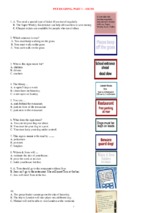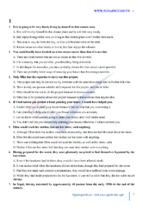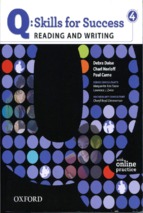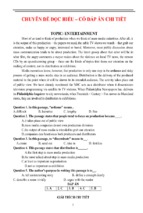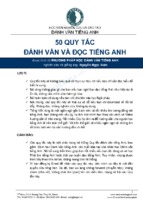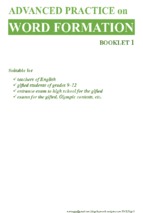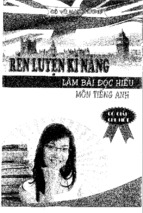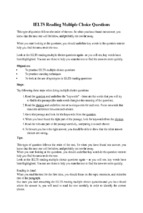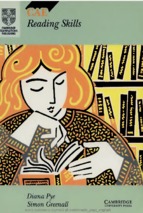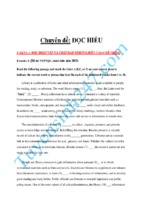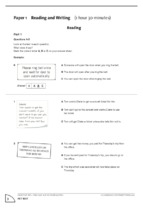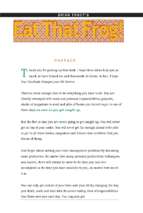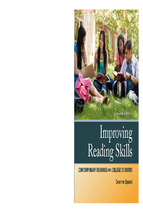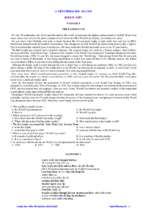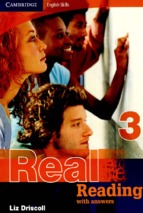LITTLE WOMEN
Stage 4
At Christmas the four March girls decide that they
will all try hard to be good, and never to be cross, or
lazy, or selfish again. Meg, the oldest, won't complain
about her job or not having pretty dresses. Jo won't
. argue and get angry and run wild like a boy. Shy Beth
will try hard to be braver, and little Amy will think less
of herself and more of other people.
They don't always succeed, of course, and sometimes
there are arguments and secrets and angry tears. But
there is also laughter and fun, and soon a new friend Laurie, the rich and lonely boy next door.
Many troubles and difficulties lie in the year ahead and the girls are growing up. Wild Jo hates the idea of
being a polite young lady, but Meg will soon be
seventeen, and ready to fall in love . . .
Louisa May Alcott was born in 1832 in Pennsylvania,
USA, and died in 1888. She came from a poor family
and had a difficult life, until the success of her famous
book, Little Women. This is based on her own family
life and the experiences of the four Alcott sisters. She
wrote three more books about the March family, Good
Wives, Little Men, and Jo's Boys.
'Christmas won't be Christmas without any presents,' said
Jo crossly.
'It's so awful to be poor!' agreed Meg, looking at her
old dress.
'It's not right for some girls to have pretty things, and
others to have nothing at all,' said little Amy.
'We've got Father and Mother, and each other,' said
Beth gently.
The four young faces round the fire cheered up as they
thought of this, but then Jo said sadly, 'We haven't
got Father, and we won't have him for a long time.' She
didn't say 'perhaps never', but each silently thought it,
remembering that he was away at the war in the South.
Then Meg said, 'Mother says we shouldn't spend money
on presents when our men are fighting a war.'
'We can't expect anything from Mother or each other,'
said Jo, 'but we only have a dollar each, and that won't
help the army much. Let's each buy ourselves what we
want, and have a little fun. We work hard to earn it.'
'7 do, teaching those awful children,' said Meg.
'What about me?' said Jo. 'I'm shut up all day working
for a terrible old lady, who gives me different orders every
five seconds!'
'I think washing cups and plates and keeping things tidy
is the worst work in the world,' said Beth. 'My hands get
too tired to play my music.'
'I have to go to school with girls who laugh at my dresses
and say cruel things because my father isn't rich,' said Amy.
'I wish we had the money Father lost when we were
little, Jo,' said Meg.
'I wish I was a boy,' said Jo. 'Then I could go and fight
beside Father!'
Meg was sixteen and very pretty, with large eyes and
soft brown hair, and white hands. Fifteen-year-old Jo was
very tall and thin. Her long, dark-red hair was usually
pushed up out of the way. Beth was thirteen, a very shy
girl who seemed to live in a happy world of her own. Amy
was the youngest, but thought herself to be the most
important. She had blue eyes, and yellow hair which curled
on to her shoulders.
At six o'clock, Beth put a pair of slippers by the fire to
warm and Meg lit the lamp. Amy got out of the
comfortable chair without being asked, and Jo forgot how
tired she was and held the slippers closer to the fire.
'These are old,' she said. 'Mother needs a new pair.'
Til get her some with my dollar,' said Beth.
'No, I shall!' cried Amy.
Tm the oldest—' began Meg.
Tm the man of the family now Father is away, and I
shall buy them,' said Jo.
'Let's each get her something and not get anything for
ourselves,' said Beth.
'That's a kind idea!' said Jo. 'What shall we get?'
Everyone thought for a moment, then Meg said, Til
give her a nice pair of gloves.'
'The best army slippers,' said Jo.
'Some handkerchiefs,' said Beth.
'A little bottle of perfume,' said Amy. 'It won't cost
much, so I'll have some money left to buy something for
me.'
'We'll let Mother think we're getting things for
ourselves, and then surprise her,' said Jo.
Mrs March arrived home soon after. She took off her
wet things and put on her warm slippers. Meg made the
tea, Jo brought wood for the fire, Beth was quiet and busy,
and Amy gave orders.
Tve got a letter from Father!' cried Mrs March.
It was a letter to cheer them up, and the special message
for the girls came at the end: Give them all my love and a
kiss. I think of them every day. I know they will be loving
children to you, and that when I come back, I will be
prouder than ever of my little women.
A tear dropped off the end of Jo's nose.
Amy hid her face on her mother's shoulder. 'I'm selfish,'
she cried, 'but I'll try to be better.'
'We all will!' cried Meg. 'I think too much about the
way I look, and hate to work, but I won't any more.'
'And I'll try to be a "little woman",' said Jo, 'and not be
rough and wild.'
Beth said nothing, but she began to work hard at a blue
army glove she was making.
So the four girls decided that they would all try very
hard to be good. They would never be cross, or lazy, or
selfish - and they would all help each other. They talked
over their plan that evening, while they made sheets for
Aunt March. Then at nine o'clock they stopped to sing a
song. Beth played the old piano, and Meg and her mother
led the singing. Jo always sang in the wrong place, but the
girls never got too old to sing together.
Jo was the first to wake up on Christmas morning, but
soon they were all awake and they went downstairs.
'Where's Mother?' asked Meg.
'I don't know,' said old Hannah. She had lived with the
family since Meg was born, and was more like a friend
than a servant. 'Some poor woman came to the door and
your mother went off to see what was needed.'
'She'll be back soon,' said Meg. She looked at the
presents for her mother which were in a basket under a
chair, ready to bring out at the right time. 'Where is Amy's
bottle of perfume?'
'She went to put some pretty paper round it, I think,'
said Jo.
Suddenly, they heard the outside door close.
'Here's Mother! Hide the basket, quick!' said Jo.
But it was Amy. She came in quickly.
'Where have you been, and what's that behind you?'
asked Meg.
'I ran to the shop and changed the little bottle of perfume
for a big one,' said Amy. 'I spent all my money to get it,
and I'm not going to be selfish any more!'
Meg smiled proudly and put her arms around her sister.
Then there was another bang from the outside door, and
the basket was pushed back under the chair. The girls ran
to the table, ready for their breakfast.
'Happy Christmas, Mother!' they shouted.
'Happy Christmas, little daughters!' said Mrs March.
Then the smile disappeared from her face. 'Girls, listen.
Not far away is a poor woman, Mrs Hummel, with a new
baby. Her six children are in one bed, trying to keep warm,
as they have no wood for a fire. There is nothing to eat
and they are hungry and cold. Will you give them your
breakfast as a Christmas present?'
For a minute no one spoke. Then Jo said, 'Mother, I'm
so glad you came back before we began to eat!' And the
girls quickly began to put their breakfast in a basket.
'I knew you would do it,' said Mrs March, smiling.
She took the girls and Hannah to a cold, miserable little
room in an old building, where they found a sick mother,
a crying baby, and a group of children with white,
frightened faces. The children were on the bed under a
blanket, trying to keep warm.
The woman almost cried with happiness when she saw
the girls. Hannah, who had brought wood, made a fire.
Mrs March gave the mother tea and hot food, then she
dressed the little baby gently. The girls put the children
round the fire and fed them like hungry birds.
It was a very happy meal, although the girls ate none of
it. But no one was happier than those hungry young ladies
who gave away their breakfast on Christmas morning.
Mrs March was surprised and pleased when she saw
her presents later. There was a lot of laughing and kissing
and explaining. Then, for the rest of the day, the girls were
busy. Jo liked to write plays, and the four of them were
going to act one that evening. They had learned their
words, and had worked hard to make strange and
wonderful clothes for all the different characters in the play.
On Christmas night, some other girls came to watch. At
first, there was a lot of whispering and laughing from the
four sisters behind the curtains. Then the curtains were
opened and the play began.
It was an exciting story about Hugo (acted by Jo wearing
a black beard!), beautiful Zara and brave Roderigo. There
were also two ghosts, a cruel king, and a tall castle made
of paper and wood - which unfortunately fell down just
as Roderigo and Zara were escaping from it. There were
screams of laughter from everyone, but the actors picked
themselves up and carried on through more dangers and
mysteries until the happy ending was reached.
All the visitors loved the play, and after the excitement
and fun came a surprise for everyone.
'Would the young ladies like to stay for supper?' asked
Hannah.
And when the girls saw the supper table, they could not
believe their eyes! There was ice-cream, cake, fruit, and
French chocolate! And in the middle of the table were
flowers for each of the four actors.
'Where did it all come from?' asked Amy.
'From Father Christmas, perhaps?' said Beth.
'Mother did it,' said Meg.
'Aunt March sent it,' said Jo.
'You're all wrong,' laughed Mrs March. 'Old Mr
Laurence sent it!'
'The I .imriur Imy's grandfather?' said Meg. 'But we
don i Know linn.
'1 Linn.ih (old his •,( i v.nii .ihout your breakfast party,
.in.I id.u pit ,r,r,l him,' -..ml Mrs M.irch. 'He knew my father
in HI, V.'.M-, .ir.o, .UK! IK- sent me a note this afternoon,
;r,K 114'. il In * onlil semi my children a few small Christmas
pi rsrlils,'
The idea came from that boy, I know it did!' said Jo.
Tm sure he wants to know us, but he's shy, and Meg won't
let me speak to him when we pass him in the street. She
says that it's not at all polite for young ladies to introduce
themselves to strangers.'
'You mean the people who live in the big house next
door, don't you?' said one of the other girls. 'My mother
knows old Mr Laurence. She says he keeps his grandson in
the house when the boy isn't riding or walking with his
tutor, and makes him study very hard. We invited the boy
to our party but he didn't come.'
'That boy needs to have some fun,' said Jo.
'Look!' said Meg, excitedly, a day or two later. She waved
a piece of paper at Jo. 'An invitation to a New Year's
party at Sallie Gardiner's house, and it's for both of us.
Mother says we can go, but what shall we wear?'
'Our best cotton dresses,' said Jo, 'because we haven't
got anything else. Yours is as good as new, but mine has a
burn and a hole in the back.'
'Then you must keep your back out of sight,' said Meg.
'I'll have a new ribbon for my hair, and my new slippers.
And my gloves are all right.'
'Mine are stained, so I'll have to go without.'
'You must wear gloves to a dance, Jo!' cried Meg.
'Then we'll each wear one good one and carry a bad
one,' said Jo.
Meg looked worried. 'All right, but you will behave
nicely, won't you? Don't stare, or put your hands behind
your back.'
On New Year's Eve, the two younger sisters watched
the two older girls get ready for the party. There was a lot
of running up and down, and laughing and talking. Meg
wanted some curls around her face, so Jo began to work
on the papered ends of Meg's hair with a pair of hot tongs.
'Should they smoke like that?' asked Beth.
'It's the wetness drying,' said Jo.
'What a strange burning smell!' said Amy.
Til take the papers off now,' said Jo, 'and you'll see lots
of little curls.'
She took the papers off - and, to her horror, the burnt
hair came off with them!
'Oh, oh! What have you done to my hair!' cried Meg.
'I always get things wrong,' said Jo unhappily. 'I'm so
sorry. I suppose the tongs were too hot.'
'Don't worry,' Amy told Meg, who was crying. 'Just tie
your ribbon so that the ends come on to your forehead a
little, and it will look quite fashionable.'
At last, Meg and Jo were ready and went off to the
Gardiners' house where Mrs Gardiner welcomed them
kindly. Meg immediately began to enjoy herself with Sallie,
but Jo wasn't interested in girlish talk and stood with her
back carefully against the wall, watching the dancing. Soon
Meg was asked to dance, then Jo saw a big red-haired boy
coming towards her and she quickly went through a door
into a small room. Unfortunately, another shy person was
already hiding there and she found herself looking at the
'Laurence boy'.
'Oh dear, I didn't know anyone was here!' Jo said.
The boy laughed. 'Don't go. I came in here because I
don't know any people, but I think I've seen you before,'
he said. 'You live near us, don't you?'
'Next door,' said Jo. 'We enjoyed your nice Christmas
present.'
'My grandfather sent it, Miss March.'
'But you gave your grandfather the idea, didn't you, Mr
Laurence?'
'I'm not Mr Laurence, only Laurie,' he said.
'And I'm not Miss March, only Jo,' she said. 'Do you
like parties?'
'Sometimes,' he answered. 'I've been abroad a lot
recently, and I don't know how you do things here.'
'Abroad!' said Jo. 'Oh, did you go to Paris?'
'We went there last winter.'
'Can you speak French?' she asked.
He said something in French, and Jo listened carefully.
'You asked, "Who is the young lady in the pretty slippers?"
It's my sister, Meg, and you knew it was! Do you think
she's pretty?'
'Yes,' he said. 'She looks so fresh and quiet.'
This pleased Jo very much, and soon the two of them
were talking easily, like old friends. 'I hear you're always
studying hard,' said Jo. 'Are you going to college soon?'
'Not for a year or two,' he said. 'I'm sixteen next month,
and I won't go before I'm seventeen.'
'I wish I was going to college,' said Jo.
'I hate even the idea of it!' said Laurie.
Jo wanted to know why, but he looked so serious that
instead of asking she said, 'Why don't you go and dance?'
'I will if you'll come too,' he answered.
'I can't because—' Jo stopped.
'Because what?'
'You won't tell?'
'Never!'
'I've a bad habit of standing near a fire, and Ixburn my
dresses,' said Jo. 'I have to keep still so that no one will see
the burn on this one. Laugh if you like.'
But Laurie didn't laugh. 'Never mind that,' he said
gently. 'Please come.'
Jo smiled. 'All right,' she said. Thank you.'
When the music stopped, they sat down and began to
talk, but Jo saw Meg waving at her. She went over and
followed her sister into a side room.
'I've turned my foot over and hurt my ankle,' said Meg.
'I can't walk on it, and I don't know how I'm going to get
home.'
'I'm not surprised you turned your foot over in those
stupid high shoes,' said Jo. 'You'll have to get a carriage or
stay here all night.'
'A carriage will cost a lot,' said Meg, 'and I can't stay
here for the night because the house is full. I'll just rest
until Hannah comes to fetch us, then do the best I can.'
'They're going in for supper now,' said Jo. Til stay with
you.'
'No, run and bring me some coffee,' said Meg.
Jo found the coffee, but immediately dropped some
down the front of her dress. She was cleaning it off with
Meg's glove when a friendly voice spoke to her.
'Can I help?' said Laurie. He had a cup of coffee in one
hand and a plate with a cake on it in the other.
T was trying to get something for Meg,' said Jo.
'And I was looking for someone to give this to,' he said.
He fetched more coffee and a cake for Jo, then the three of
them had a happy time talking together until Hannah
arrived. Meg completely forgot about her foot and stood
up quickly. She cried out with pain, and when Laurie saw
that she could not walk, he immediately offered to take
them home in his grandfather's carriage.
'But you can't want to go home yet,' said Jo.
T always go early,' said Laurie.
He sat with the driver, and the two girls sat with Hannah
inside the carriage and talked excitedly about the party.
'I had a wonderful time, did you?' said Jo.
'Yes, until I hurt myself,' said Meg. 'Sallie's friend, Annie
Moffat, has asked me to go and stay with her for a week in
the spring, when Sallie does.'
Jo told Meg her adventures, and then they were home.
They thanked Laurie and went quietly into the house,
hoping to wake no one. But as soon as they opened their
bedroom door, two little voices cried out: Tell us about
the party! Tell us about the party!'
'It's so nice to go to parties and drive home in carriages,'
said Meg, the next morning. 'Other people live like that
all the time, and I wish we could. I wish we were rich.'
'Well, we're not,' said Jo. 'So we must do our work
with a smile, the way Mother does.'
Mr March had lost most of his money helping a friend.
When the two older girls discovered this, they wanted to
do something to earn some money for the family, and as
soon as they were old enough, they found work. Meg got
a job teaching four small children. It was hard for her to
be poor because she could remember the time when their
home had been beautiful, with everything they wanted.
And every day at Mrs King's house she saw pretty dresses,
and heard talk of parties and the theatre - all the things
which Meg loved.
Jo went to Aunt March, who needed someone to fetch
and carry things, and read to her. She was a difficult old
lady who complained a lot, but Jo did her best.
Beth was much too shy to go to school with other
children, so she studied at home with her father. When he
went away, and her mother was busy with war work, Beth
continued to study by herself and helped Hannah keep the
home tidy for the others. She also spent long, quiet hours
alone, talking to her dolls or playing the old piano. Beth
loved music and, although the family could not afford
music lessons or a good piano for her, she tried hard to
make herself a better
musician.
Amy drew the most
beautiful pictures and
wanted to be a famous
painter one day. She
was a favourite with
everyone, except when
she complained about
having to wear her
cousin's old clothes
because her mother
could not afford to
buy new ones for her.
One afternoon a week or two later, Jo went outside to
clear the snow away from some of the garden so that Beth
could walk there when the sun came out. She looked across
to the house next door - a big stone house with lovely
things inside that Jo occasionally saw through the open
curtains at the windows. But it seemed a lonely, lifeless
kind of house, as no children played outside, no motherly
face smiled at the windows, and not many people went in
and out, except the old gentleman and his grandson.
She had not seen the Laurence boy lately and wondered
if he was away, but suddenly she saw him looking out of
an upstairs window. She threw up a handful of soft snow
- Xem thêm -

